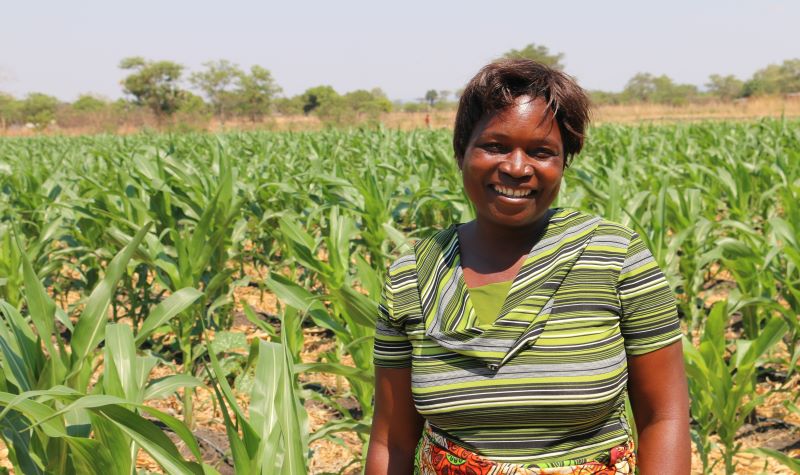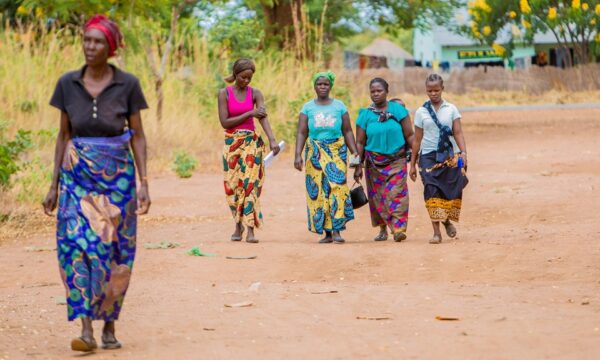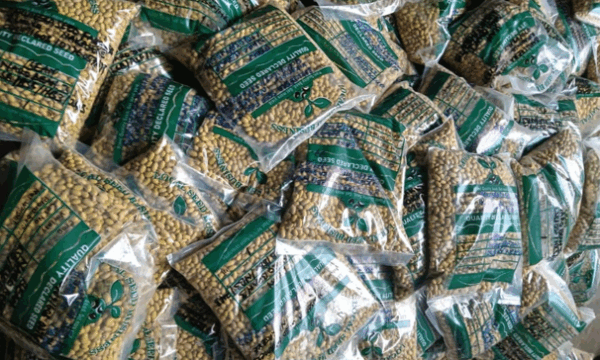Women are key to the future of agriculture and ending world hunger. Currently, female farmers make up 43% of the global agricultural workforce and play an important role in farming production and improving food security. However, the hurdles women face are real. Women often find it harder than men to access agricultural information, finance and land.

A new study entitled Gender-differentiated impacts of plant clinics on maize productivity and food security: Evidence from Zambia, looks at the gender impacts of Plantwise plant clinics on farmers in the country. Using data collected from 837 smallholder households in rural Zambia, the CABI research examines whether male and female farmers who visit Plantwise plant clinics gain equal benefits in terms of technology adoption, maize productivity and food security.
Plantwise plant clinics for all farmers
Plant clinics are set up at public places such as markets and village centres. Farmers can bring a sample of any ‘sick’ crop where a plant doctor will be able to identify, diagnose and recommend treatment for the farmer to consider.
The Plantwise programme ensures activities are accessible to all farmers and are run in a way that promotes gender equality. This includes training female plant doctors, holding clinics in locations and at times convenient to women, and linking clinics to existing women’s groups.
Zambia has been making rapid progress in closing the gender gap in recent years and increasing the number of female farmers visiting plant clinics with similar queries to their male counterparts. The study found that participation in Plantwise plant clinics is beneficial for all users and has a positive impact on reducing food insecurity. Farmers that use plant clinics are more likely to adopt multiple pest management approaches, meaning greater crop yields and higher incomes. However, these positive effects are greater for male plant clinic participants. For example, male clinic users obtained maize yield increases of about 18% compared to 8% for female clinic users.
Overcoming gender differences in farming
Attendance at plant clinics improved all three food insecurity indicators (experienced food insecurity, severe food insecurity, number of months of food insufficiency) for both women-headed households and women spouses. In addition, the study found that women plant clinic users reduce the number of months of food insufficiency by under one month (about 22 days) compared to non-users, and men by 17 days.
Decision-making power
The results also indicate that among the female participants, the benefits from using plant clinic services are larger for women-headed households (21% yield increase) than for women spouses (3% yield increase). This indicates the advantage of women having decision-making power.
Female farmers that are spouses need extra support if they are to benefit from clinics in the same way as men. Lead author Dr Justice Tambo adds ‘any policy support to exploit the economic benefits of female participation should consider the differential implications for female household heads and females in male-headed households.’.
In summary, the report’s findings indicate that providing smallholders with plant health diagnostic and advisory services via plant clinics is worthwhile in terms of improved management of crop pests, increased productivity and achieving household food security. Participating in plant clinics allows both male and female farmers to significantly increase the adoption of crop protection techniques, but this is not sufficient to overcome the gender disparity in agricultural productivity.
CABI: Empowering female farmers
It is widely acknowledged that if we are to improve food and nutritional security then we need to empower women and address gender inequalities. Estimates from FAO (2011) suggest that bridging the gap between men and women in access to agricultural resources could increase yields on women’s farms by 20%–30%.
CCABI’s goal is to create opportunities for women and young people in agriculture by investing in inclusive economic growth. Our work encourages more food production and trade, while considering how women can share the benefits of growth.
Full paper reference
Justice A. Tambo, Mathew Matimelo, Mathias Ndhlovu, Fredrick Mbugua, Noah Phiri, ‘Gender-differentiated impacts of plant clinics on maize productivity and food security: Evidence from Zambia’ World Development 145 (2021): 105519, https://doi.org/10.1016/j.worlddev.2021.105519
Read the full paper here
For more information about the Plantwise Programme see https://www.plantwise.org/
For more information on CABI and gender and youth see https://www.cabi.org/about-cabi/gender-and-youth/
Read more
Plantwise Donors
This research was funded by the CABI-led Plantwise programme, which is financially supported by the Foreign, Commonwealth & Development Office (FCDO), United Kingdom; the Directorate- General for International Cooperation (DGIS), Netherlands; the Swiss Agency for Development and Cooperation (SDC); the European Commission (DG DEVCO); the Australian Centre for International Agricultural Research (ACIAR); the Ministry of Agriculture and Rural Affairs of the People’s Republic of China; Irish Aid; and the International Fund for Agricultural Development (IFAD).
Related News & Blogs
How do pest risk registers address the spread of plant pests in Africa?
Pest risk registers can help to solve problems in agriculture, addressing the growing global threat of plant pests. Moreover, changing weather patterns, led by rising temperatures, are causing them to reproduce faster and expand into new regions. In ad…
10 July 2025




